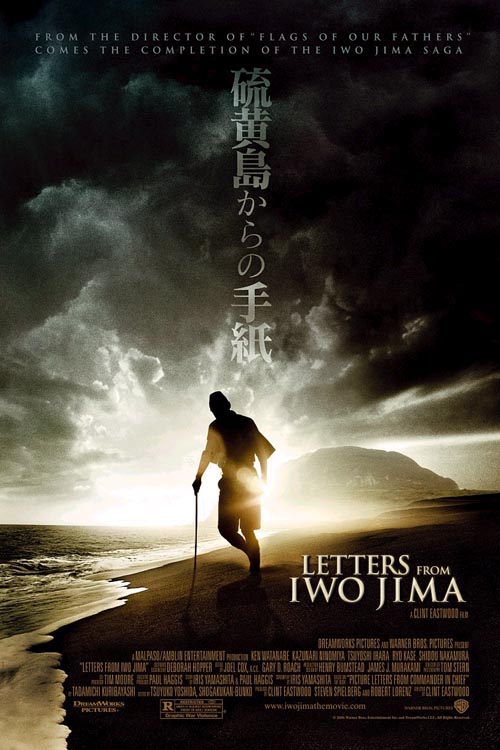Anthony's Film Review
Letters From Iwo Jima (2006)

A significant war in American history seen through the other side, and it's beautifully presented...
Clint Eastwood directed both Flags of Our Fathers and Letters From Iwo Jima as complementary films to show both sides of the famous World War II battle on Iwo Jima. Any war movie has the potential to tell a great story. However, the best way to appreciate the details of a war or other historical event is to see it from all sides. It would be a matter of time before some filmmaker would come up with the idea of making two concurrent films about the same war. Clint Eastwood stepped in to do so, and I think what he did was very clever.
Letters From Iwo Jima explores the Japanese side of the Battle of Iwo Jima and focuses on two sets of Japanese characters: the commanding officers and the soldiers. The main character representing the higher ranks is General Tadamichi Kuribayashi, brilliantly played by Ken Watanabe. We see him early in the film making tough strategic decisions, in preparation for an invasion by the Americans. Among the soldiers, the story focuses mainly on Saigo, a poor baker who leaves his pregnant wife after being called to war. He is not the type of person who is truly ready to fight. As he is digging a trench on a beach on Iwo Jima, he already talks about surrendering. He starts to get beaten when one of his superiors overhears that comment, an unwelcome sign of what is to come.
Once the first American plane is witnessed in the air, the intense drama begins. Explosions, gunfire, and casualties throw the Japanese into chaos. These scenes and all other battle scenes are spectacular to watch. In between the scenes of war are memorable scenes of dialogue. What makes the film a powerful one is the hopelessness and despair among the Japanese, even before the battle actually starts. There are intense scenes involving suicide and deciding whether to attack or hide. This is a war film that is dramatic not because of the odds involved to achieve victory, but because of what the various characters do knowing that the battle is really a suicide mission.
Of course, we cannot ignore the real essence of a war film: who the characters are before donning their uniforms. This is shown through various flashback scenes with Kuribayashi and Saigo. There is also one present-day scene featuring both Kuribayashi and an American POW that I thought was nice, because it treats the American soldier as a real person. Then there are the letters. The characters spend quiet time writing letters to their loved ones back home. We see their letters narrated as another way to tell the story. Hence, the title of the film.
Lastly, it is worth noting another genre this war film belongs to. With Japanese dialogue accompanied by English subtitles, Letters From Iwo Jima is also a foreign language film, which is amazing considering that the director is American. The inspiration really goes beyond the story. The cross-cultural nature of the filmmaking is also symbolic of the peace that we all strive for.
Letters From Iwo Jima has got it all when it comes to war films. It has emotional drama and heart-stopping battle scenes, and it's done at a pace that allows us to really take it in. Fans of war movies, and especially those interested in the Battle of Iwo Jima, will not be disappointed with this one. Letters From Iwo Jima is an outstanding film and a masterpiece that exemplifies Clint Eastwood's skill as a film director.
Anthony's Rating:










For more information about Letters From Iwo Jima, visit the Internet Movie Database.
In addition, check out my review of the complementary film Flags of Our Fathers.
Home
Film Reviews
Other Reviews
Commentaries
Links
About AFR
RSS Feed
Privacy Policy
E-mail Anthony











